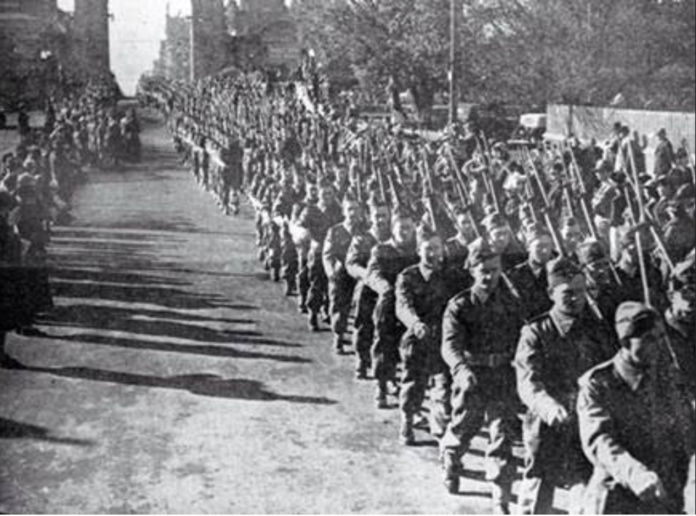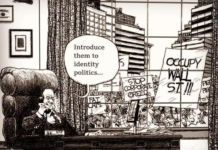SHOULD NEW ZEALAND have declared war on Germany on 3 September 1939? This is the startling question posed by Stevan Eldred-Grigg, one of New Zealand’s more interesting historians, in an essay posted on The Spinoff. I say “startling” because, while many would argue that New Zealand should have stayed out of World War I, the number suggesting we should have stayed out of the fight against fascism is vanishingly small.
The first great global conflict of the Twentieth Century may have been a vicious brawl between competing imperial powers, tricked out in the bunting of King and Country and, later, as a noble crusade “to make the world safe for Democracy”, but the Second World War was the real thing. Adolf Hitler and his regime constituted a clear and present danger to human civilisation which simply had to be stopped.
Eldred-Grigg’s revisionism should not, however, be dismissed out of hand. Nothing is lost by holding the icons of our history up to the light and scrutinizing them closely for flaws and blemishes. Such scrutiny becomes an urgent necessity when the accusation is made that the historical icon in question depicts a lie. Let us then take a closer look at Eldred-Grigg’s argument.
His case against New Zealand’s participation in the war is presented in two parts. The first suggests that the “hard-headed” strategic and economic arguments for joining the fight against Hitler simply do not stack up. Great Britain, he says, was simply too far away to offer the slightest strategic protection, and Nazi Germany too far away to pose a credible threat. Our export trade, he implies, would have prospered regardless of which nation emerged victorious.
The second line of attack is directed at what Eldred-Grigg calls the “soft-hearted” reasons for ranging ourselves alongside the “Mother Country”. Poland, he suggests, wasn’t worth fighting for – being little better than Nazi Germany in terms of its politics. Likewise, the Mother Country, herself. Great Britain remained an imperial power whose hands, vis-à-vis the promotion of freedom and democracy, were still far from clean. “[B]eliefs about freedom and democracy, together with emotions about duty and loyalty”, Eldred-Grigg suggests, were an insufficient justification for plunging New Zealand into someone else’s war.
But, Eldred-Griggs revisionism is wrong on all counts.
Strategically-speaking, Great Britain was not that far away at all. In 1939, the Royal Navy was still capable of considerable force projection – even as far as the Southern Hemisphere. Moreover, if Britain had been defeated by Germany, and the Royal Navy had fallen into the hands of theKriegsmarine, how long does Eldred-Grigg think it would have taken the Fuhrer’s reflagged battleships to come a-calling?
As for New Zealand’s economic situation on 3rd September 1939 – well, it was parlous. The Labour Finance Minister had earlier that year visited Britain seeking the continued co-operation of the Bank of England and the City of London in extending New Zealand’s lines of credit. This they were most reluctant to do. Labour’s social welfare reforms and her state house construction programme did not meet with the British bankers’ approval. Had war not broken out in September 1939, it is almost certain that British capital would have put a suffocating financial squeeze on the errant left-wing government of its far-flung economic colony.
The outbreak of war radically shifted the pieces on the economic board in New Zealand’s favour. Michael Joseph Savage’s famous declaration: “Both with gratitude for the past and confidence in the future, we range ourselves without fear beside Britain. Where she goes, we go; where she stands, we stand.”, wasn’t simply a “soft-hearted” acknowledgement of “duty and loyalty”. It was also a hard-headed decision to do what was required to keep the workers’ government in office.
The weakness of Eldred-Grigg’s argument lies precisely in its refusal to acknowledge the political context in which the decision to go to war was taken. Does he really suppose that a left-wing New Zealand government which refused to join Canada, Australia and South Africa at Britain’s side could have endured in office for more than a few days? Has he forgotten that, as Mickey Savage was committing New Zealand to a war against fascism, the Soviet Union was preparing to roll across the Polish border in fulfilment of the secret protocols of the Nazi-Soviet Pact? Can he not see that the National Party and the newspapers would have accused the Labour Party, with ample justification, of taking up a position indistinguishable from that of the Moscow-aligned Communist Party? An historian of Eldred-Grigg’s standing must, surely, acknowledge that Savage, Nash, and the prime-Minister-in-waiting, Peter Fraser, would not have been able to convince their own Labour caucus – let alone the broader New Zealand electorate – that such a position was even remotely tenable?
A decision to remain neutral in September 1939 would have produced only one thing – a crushing victory for the right of New Zealand politics. All of Labour’s work between 1935 and 1939 would have been undone. The state housing programme would have been abandoned, and what the National Party leader, Sid Holland, described as the “applied lunacy” of the Social Security legislation would have been swept away.
That is the price the New Zealand working-class – whose interests Eldred-Grigg has long and honourably championed – would have had to pay. Not for peace, because peace was never on the agenda; but for the utter foolishness of those who thought they could stay out of the most important moral struggle in human history.
And therein lies the clinching argument. Staying out of the war fails not only on the hard-headed grounds of preserving New Zealand’s strategic and economic interests; and not just on the soft-hearted grounds of duty and loyalty to the nation that had given New Zealand birth; but, ultimately, on the grounds of the damage it would have inflicted on New Zealand’s soul – for want of a better word.
No possible outcome of the war could have left us unsullied in the eyes of the civilised world. Had Britain accepted Hitler’s generous surrender terms in 1940, we would have fallen under the sway of the very worst elements in British – and New Zealand – society. Why? Because a British Empire in thrall to Nazi Germany would have been a fascist empire. And, if Britain had won the war without us? What would we be then? Certainly not the widely respected “social laboratory of the world” whose Prime Minister spoke up successfully for the rights of small nations at the San Francisco Conference which gave birth to the United Nations. No, New Zealand would have found itself lumped in with the likes of Eamon De Valera’s Ireland, and Juan Peron’s Argentina: countries not-so-secretly regretful that Hitler had been defeated.
How would Stevan Eldred-Grigg feel, I wonder, writing the history of a nation like that?






Neutral countries did the best during and after the war.
Thats pretty much automatic isn’t it John? If they were allowed to remain on the sidelines and neither attacked nor stepping in to help those being attacked, and allowed to quietly sell arms , perhaps to both sides, they would be in a win win situation. One man’s war is another man’s fortune. Same goes for countries. That’s what the states and UK have been working on ever since with arms sales to all trouble spots anyway.
D J S
Well I certainly wouldn’t have gone into an alliance with Hitler. Hitler would have screwed us over if we didn’t screw him over first.
Even after WW2 levelled Germany, (West) Germany’s economy surpassed Britain’s by 1950, and was massively booming and expanding throughout the 1950s. To paraphrase “Yes Minister,” Germany was able to buy its way back into the human race.
To say nothing of Germany’s central geographic location. I’d be completely fine with German expansion if I knew I had the bigger gun. Although Germany is now our allie, America never did pull its bases out of Germnay for stabilities sack.
Very true I’m sure.
And worth re pondering each time we commit troops to support the USA in their endeavors of various motivation.
Because if we don’t stay strongly allied to the USA and Australia, who has our back when the fascist Han Chinese empire come to “protect” their assets and people here?
When the fascist Han Chinese empire come to protect their interests the USA and Australia will look after their own interests. If helping us coincides with that they will help us , if not they will not.
D J S
It will always be in Australia’s interest for us not to be overrun.
As for America , I agree, which is why we should stay close.
Absolutely correct David.
Ironically the economic policies of the British government and the Bank of England were to keep the pain of the depression in place in the UK right up to the outbreak or war. In the US, the new deal and our policies here meant our economies had started to grow. Revisionism often misses key aspects of the way in which the economic or social mores of the time prevail. Our economy was much more closely integrated with the UK at that time. We didn’t have the domestic manufacturing capacity we developed during and post war. Our exports which would have continued to the UK would have been attacked regardless of our neutrality. Our merchant fleet would have been decimated. To say we were isolated here is to ignore the direct attacks that occurred due to the mining of the approaches to the Hauraki gulf by the Orion. This accounted for six vessels including the Niagra off Whangarei and later sinking the Rangitane off Nauru. This was in June 1940. It is likely that the Pacific war would have played out the same way in any event. The Japanese quickly eliminated the British and colonial forces in the Pacific region, helped by intelligence gathered by German raiders in Pacific waters. Australia was under threat and the US needed a backup base in the Pacific which we became. Due to Japanese intentions we were a target and we could not avoid this. A condition of the alliance with the US would have been involvement in Europe. So we would have ended up fighting Germany in any event.
Also the German raiders sank the Turakina 300 miles off Taranaki. They were quite active around NZ seizing one of the Holm ships off the Chathams and even destroying the depots on the Southern Ocean Islands (such as The Antipodes, Auckland etc) that were there for shipwrecked sailors.
Eldred-Griggs is dead right in a sense. That said NZ was an imperialist puppet during both WWI and II so its involvement was I believe unavoidable in that regard. The second world war need not have happened if Versailles was not such a heavy handed exercise is usury. It should have been up to the UK and France, etc to clean up the mess they created without our involvement.
In my opinion too its our commitment to these kind of foreign led imperialist ventures that keeps us under tacit foreign governance.Its only getting worse too with the passage of the CP-TPP and now probable RCEP both of which I believe meet the imperialism litmus test.
Suffice to say if we won’t learn from the past and stand for ourselves no one going to do ti for us.
Here, here!
Given that the orders of battle and the weapon systems are in large part consequences of war itself, Eldred-Griggs’s problem lacks way too many precisions to be dealt with properly.
It’s a big “if” if the war didn’t start the same way. I’d put bets on that Poland allies with Germany and possibly even most of Central Europe falls to the axis.
German fuel efficiency and mechanical reliability up 400% better, RADAR guided AAA of all kinds being a thing, Submarines being far more dangerous, along with the Germans able to bombard the entirety of the UK with missiles and rockets, and decades for Germany to build up warstocks, geermany shits out several Graf Zeppelin carrier groups, everyone gets a full blitzkrieg Army and we are fully fucked.
Either Germany losses faster or we loss starting with the Africa campaign. And with no Africa campaign we probably wouldn’t have an SAS today. This is just crazy talk.
Germany did not have fuel efficiency during WWII. Its was in fact one of their biggest weaknesses. They had to resort to synthesising fuel which is extremely expensive and was one of the real reasons Hitler attacked the USSR.
*** a clear and present danger to human civilisation which simply had to be stopped.***
Unlikely. Their concern was with Russia and avoiding the kind of Communist revolution that had occurred there. According to historian A. J. P. Taylor, “Eastern expansion was the primary purpose of Hitler’s policy, if not the only one.” To Labor Party statesman Roy Denman, “The fear that after Poland Hitler would have attacked Britain was an illusion….Britain was dragged into an unnecessary war.”
On August 11, 1939, Hitler had railed to the Danzig League of Nations commissioner: “Everything I undertake is directed against Russia. If the West is too stupid and too blind to comprehend that, I will be forced to come to an understanding with the Russians, to smash the West, and then after its defeat, to turn against the Soviet Union.”
This, writes Henry A. Kissinger, “was certainly an accurate statement of Hitler’s priorities: from Great Britain, he wanted non-interference in Continental affairs, and from the Soviet Union, he wanted Lebensraum, or living space.”
Kissinger?? A warmonger with an agenda.
John W: “Kissinger?? A warmonger with an agenda.”
He was and is. However: that doesn’t mean that he was wrong in his assessment of Hitler.
Mike has it exactly right.
Takes on to recognise one perhaps but Kissiger’s word is highly suspect on most fronts. Questions surround Kissinger motives always. His Zionist affiliation was one, banker family alliance another.
It may depend on who and what he is kissing at the time.
I thought they were national socialists, not national fascists…
Revisionism; the dead end by-way that seems to be disappointingly popular these days.
Stevan is right, insofar as he sees both WW1 and WW2 as disputes between imperialist powers in which workers have no class interest. The fact that Germany had an open fascist regime itself is only significant in making clear that all imperialist wars are directed ultimately at destroying the working class. That is why the USSR was the real target of all these powers in both world wars. WW1 was a minor dispute between bosses that rapidly gave way to a united invasion of the young USSR to remove the Bolshevik ‘threat’ to global capitalism. While that invasion failed is did isolate and badly damaged the USSR hastening the rise of the Stalinist bureaucracy. WW2 was a continuation of the unfinished WW1 to destroy the USSR as a beacon to the world’s workers.
So the most important question for NZ workers was not neutrality, though that would have been better than joining the imperialist war. Workers should never be neutral in what is ultimately a class war. As an economic colony of Britain, NZ workers should have sided with Russia against all the imperialist powers and their lackey ruling classes in the colonies. The same stand was necessary in each of the imperialist powers. Trotsky argued that while their main enemies were their own ruling classes, it was the duty of workers to get arms to the USSR for its defence. Despite the Stalinist regime, the USSR still had state owned property legally owned by workers. And notwithstanding the bosses’ campaign to target the ‘red menace’, workers around the world still looked to the USSR as a progressive liberating force.
NZ workers siding with Russia would have been allies of the Russian workers and peasants in uniform who fought Fascism as the mortal enemy of the USSR. Mortal as in Germany’s advance into Russia in 1918, and again in 1942 with the Siege Stalingrad. Russian fighters were the biggest factor in the defeat of Germany. Workers refusing to fight for imperialism, and defending the USSR against imperialism was the only principled position in both wars. So there is no moral question here for the working class except to refuse to fight in any inter-imperialist war, and to defend those attacked by imperialism, because in the class war the only morality is to win.
I read a library book years ago by an NZ author (forgotten the title of the book and the author which is a shame) about New Zealand under Nazi rule after winning the war against the UK and the commonwealth. Our troops were still confined or working in Europe and NZ was a prize.
It was shocking not for the warfare which was hardly mentioned but the collaboration, the Jew baiting, the informing and the large number who in the first year applying to join the Nazi Party. The industrialists, farmers and those in powerful positions were not harmed but nurtured.
It wasn’t a literary masterpiece by any means but it left me sickened.
My father volunteered the day war was declared, was shot down off Corfu and spent 3 years as a POW. I’m glad that people like him put their lives on the line. Now after 75 years it looks like the Fascists will take power again in many countries this time by stealth and intimidation.
The only real danger to freedom in this country comes from the colonial state.
The same state which a mere six years after VE day introduced draconian and abominable “Public Safety” emergency regulations which would have done Hitler and Mussolini proud, and supplied arms to the French forces in Vietnam in a desperate bid to retain European colonial rule throughout the Indo-Pacific region.
It is a moot point as to whether New Zealanders should have joined in the war against the Third Reich and the Empire of Japan.
But it was absolutely wrong, even criminally wrong, for New Zealand lives to be sacrificed in defence of the European empires and their colonial dominions.
Many thousands of vehemently anti-fascist New Zealanders understood that at the time and refused to fight for the Realm.
Those who want to fight fascism can do it right here on our own soil.
Fighting fascism on home soil in impossible because there is no such thing as a good Nazis in Nazis Germany. Any opposition to fascism was brutally murdered. How you say that everyone should fight fascists is just impossible.
Surely Irish Australian Micky Savage didn’t feel his war declaration. Otherwise why was he a worker for the people? From his background. But our Scots/English people wouldn’t have put up with it. Unlike the difficulties Anglo-Irish Oz always raised. And wasn’t it a good cause.
Comments are closed.